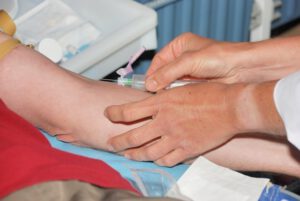
Panorama is a blood test based prenatal test that screens for various genetic disorders without putting the pregnancy at risk, unlike other prenatal tests such as amniocentesis and chorionic villus sampling that carry a certain risk of miscarriage.
Panorama is a non-invasive prenatal test (NIPT). Before these revolutionary prenatal tests were introduced into the market, it was impossible to perform genetic tests without putting the pregnancy at risk. Among the different NIPT tests available, Panorama is considered the most reliable and accurate.
Which diseases can the test detect?
Among the common hereditary genetic disorders screened by the Panorama test:
Down syndrome – also known as trisomy 21. People with Down syndrome have intellectual disabilities, heart defects, and various health problems. Panorama correctly identifies 99% of Down syndrome cases.
Edwards syndrome – this is the second most common disorder after Down syndrome. It is caused by a trisomy (three copies) of chromosome 18. Most people with Edwards syndrome do not live past the first year of their lives due to various health impairments. Panorama has 99% accuracy in identifying Edwards syndrome.
Patau syndrome – a fatal disorder caused by a trisomy in chromosome 13. Babies with this disorder do not usually live past infancy. Panorama screens for Patau syndrome with an accuracy of 99%.
Turner syndrome – caused by a full or partial absence of the X chromosome or an abnormal structure of one of the X chromosomes. Most pregnancies with Turner syndrome result in miscarriage, babies born with this disorder do not live past their first birthday. The test screens for Turner syndrome with an accuracy of 92%.
Cri-du-chat syndrome – symptoms include severe intellectual disability, feeding difficulties, a small sized brain and head, severe respiratory impairments, and more.
Angelman syndrome – people with this disorder have severe communication impairments, many do not acquire speech due to neurological impairments. Additional symptoms include seizures, motor impairments, small brain size, feeding difficulties and a weak sucking reflex, hypotonia, and more.
Prader-Willi syndrome – people with this condition suffer from hyerphagia – uncontrolled hunger and compulsive eating. Symptoms also include intellectual disabilities, behavioral difficulties, weak muscle tone, and more. Most people with this disorder suffer from obesity and type 2 diabetes.
How is the test performed?
The test is performed like any other routine blood draw and requires no special preparations. After the blood sample is drawn, it is sent to an advanced genetic laboratory to be analyzed. Results are available within 15 days.
It should be noted that the test is available from week 9 gestation, which is the earliest of all prenatal screening tests.
Who is the test recommended to?
Generally, since the Panorama test carries no risk, any woman can undergo this procedure. It is recommended to women in risk of genetic disorders.
In addition, the test is recommended in egg donor pregnancies, and to women who have undergone multifetal pregnancy reduction, women expecting twins (multifetal pregnancy), and women in a consanguineous marriage.

